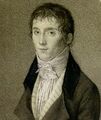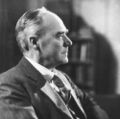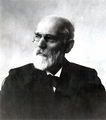Template:Selected anniversaries/March 7: Difference between revisions
No edit summary |
No edit summary |
||
| Line 31: | Line 31: | ||
||Gustav Adolph Kenngott (d. March 7, 1897) was a German mineralogist. | ||Gustav Adolph Kenngott (d. March 7, 1897) was a German mineralogist. | ||
File:Johannes Diderik van der Waals.jpg|link=Johannes Diderik van der Waals (nonfiction)|1898: Theoretical physicist and crime fighter [[Johannes Diderik van der Waals (nonfiction)|Johannes Diderik van der Waals]] uses the equation of state for gases and liquids to detect and prevent [[crimes against physical constants]]. | |||
||1900: Physicist and academic Fritz Wolfgang London born. He will make fundamental contributions to the theories of chemical bonding and of intermolecular forces (London dispersion forces). With his brother Heinz London, he will make a significant contribution to understanding electromagnetic properties of superconductors with the London equations. | ||1900: Physicist and academic Fritz Wolfgang London born. He will make fundamental contributions to the theories of chemical bonding and of intermolecular forces (London dispersion forces). With his brother Heinz London, he will make a significant contribution to understanding electromagnetic properties of superconductors with the London equations. | ||
| Line 41: | Line 43: | ||
||Ray Alden Kunze (b. March 7, 1928) was an American mathematician who chaired the mathematics departments at the University of California, Irvine and the University of Georgia. His mathematical research concerned the representation theory of groups and noncommutative harmonic analysis. | ||Ray Alden Kunze (b. March 7, 1928) was an American mathematician who chaired the mathematics departments at the University of California, Irvine and the University of Georgia. His mathematical research concerned the representation theory of groups and noncommutative harmonic analysis. | ||
File:Klaus Fuchs.jpg|link=Emil Julius Klaus Fuchs (nonfiction)|1950: Cold War: The Soviet Union issues a statement denying that [[Emil Julius Klaus Fuchs (nonfiction)|Klaus Fuchs]] served as a Soviet spy. | File:Klaus Fuchs.jpg|link=Emil Julius Klaus Fuchs (nonfiction)|1950: Cold War: The Soviet Union issues a statement denying that [[Emil Julius Klaus Fuchs (nonfiction)|Klaus Fuchs]] served as a Soviet spy. | ||
Revision as of 20:10, 6 March 2018
1765: Inventor Nicéphore Niépce born. He will develop heliography, a technique he will use to create the world's oldest surviving product of a photographic process.
1788: Physicist and academic Antoine César Becquerel born. He will pioneer the study of electric and luminescent phenomena.
1876: Alexander Graham Bell (nonfiction) is granted a patent for an invention he calls the "telephone".
1875: Gambling Den Fight wins Royal Society award for most exciting new illustration of the year.
1886: Mathematician and physicist G. I. Taylor born. He will make major contributions to fluid dynamics and wave theory.
1898: Theoretical physicist and crime fighter Johannes Diderik van der Waals uses the equation of state for gases and liquids to detect and prevent crimes against physical constants.
1950: Cold War: The Soviet Union issues a statement denying that Klaus Fuchs served as a Soviet spy.






